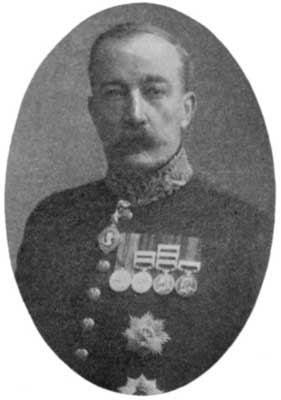George Roos-Keppel facts for kids
Quick facts for kids
George Olaf Roos-Keppel
|
|
|---|---|
 |
|
| Born | 7 September 1866 |
| Died | 11 December 1921 |
| Allegiance | |
| Service/ |
British Army |
| Years of service | 1886–1920 |
| Rank | Lieutenant Colonel |
| Battles/wars | Third Anglo-Afghan War |
| Awards | Knight Grand Commander of the Order of the Indian Empire (1917) Knight Commander of the Order of the Star of India(1915) |
Sir George Olaf Roos-Keppel was a British military officer. He was born on September 7, 1866, and passed away on December 11, 1921. He played a very important role in the North West Frontier Province (which is now part of Pakistan).
Sir George served as a Political Agent in areas like Kurram and Khyber. Later, he became the Chief Commissioner of the North West Frontier Province from 1908 to 1919. He is also remembered for his part in the Third Afghan War.
Contents
Life Story of George Roos-Keppel
George Roos was born in London, England. His father, Gustaf Ehrenreich Roos, was a Swedish merchant. In 1890, George changed his last name to Roos-Keppel. This was a request from his Dutch-Swedish grandmother. He studied at the Royal Military College, Sandhurst, which is a famous military school.
Starting a Military Career
George Roos joined the Royal Scots Fusiliers as a lieutenant in 1886. He became a captain in 1895. Later, he moved to the Indian Staff Corps in 1897. This was a special part of the British Army in India.
In 1900, he became a Political Officer in the Khyber region. He also temporarily led the Khyber Rifles, which was a local frontier force. For his good work, he received an award called the Companion of the Order of the Indian Empire. He continued to rise in rank, becoming a major in 1902 and a lieutenant-colonel in 1907.
Important Work and Achievements
In 1908, George Roos-Keppel was knighted, which means he received the title "Sir." He became a full Lieutenant-Colonel in 1912.
A very important thing he did was help establish Islamia College (Peshawar) in 1913. He worked with Nawab Sir Sahibzada Abdul Qayyum to create this college. It was a big step for education in the region.
Roos-Keppel was also very good at the Pashto language. He was even the president of a committee that tested people on their Pashto skills. He recognized the talent of a young graduate named Inayatullah Khan. He appointed him as the Vice Principal of Islamia College when Inayatullah was only 24 years old. Later, Inayatullah became the Principal.
Sir George received more high honors, becoming a Knight Commander of the Order of the Star of India in 1915 and a Knight Grand Commander of the Order of the Indian Empire in 1917. He retired from the Indian Army in 1920 and passed away the next year.
Contributions to Language and Education
Sir George Olaf Roos-Keppel was very skilled in the Pashto language. He helped others learn it too.
- In 1901, he updated and published new versions of two important Pashto books: Ganj-e-Pashto and Tarikh-e-Sultan Mahmud-e-Ghaznavi. These books became standard textbooks for military officers.
- He also wrote 'The Pashto Manual' in 1901. This was a guide book to help people learn everyday Pashto. He released a second edition in 1907.
 | Roy Wilkins |
 | John Lewis |
 | Linda Carol Brown |

